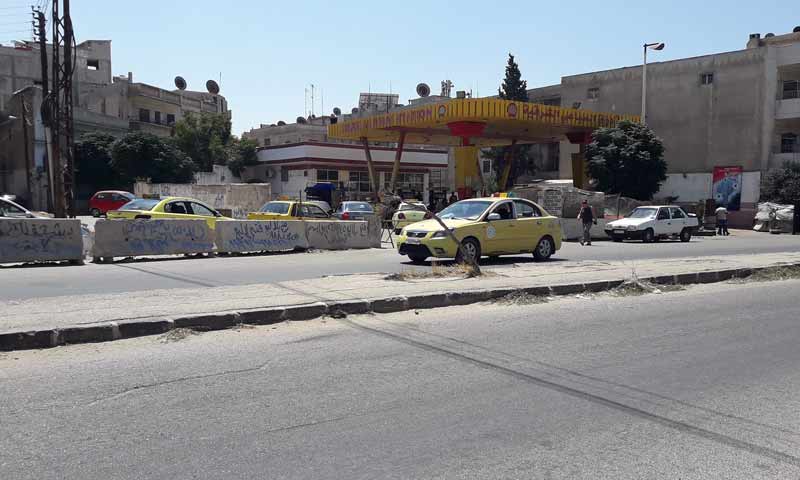



The fuel crisis in the city of Homs has entered its second week without any indication that it will end soon, despite the concerned entities intervention and the establishment of mobile filling stations in the city.
The Syrian Minister of Petroleum Ali Ghanem and the Mayor of Homs Governorate Talal Barazi have both attended the opening of a mobile filling station near the Provincial Department. However, the crisis is yet on and the car lines are increasing one day after another without indications that a solution is to appear in the near future.
Assad’s forces announced full control over Homs governorate after the displacement of the opposition factions from the northern countryside of Homs last May, the announcement was accompanied with service deterioration and crises, starting with bread and the accumulation of garbage in the governorate’s center and its rural parts.
In interviews with the government media outlets, officials in Homs governorate are justifying the gasoline crisis by the “Syrian army’s victories” in the northern countryside of Homs and that the stations in the area are supplied with fuel without reporting the amounts delivered to the Provisional Department in general. Nonetheless, the stations in the rural parts of Homs are supplied with fuel two times only after the area has been controlled by Assad’s forces.
A filling station owner in the northern countryside of Homs, on the condition of anonymity, said: “Officials are speaking of the gasoline crisis as if the filling stations in rural Homs have effected it, knowing that in four months, each filling station was supplied with fuel two times only, once with gasoline and another with diesel fuel, forgetful of the fuel smuggled to Lebanon and the black market.”
The Syrian officials are aware of the fuel being smuggled from Syria to Lebanon, for smuggling is a profession through which many Syrians make a living at the border line. In June, the Lebanese Minster of State for Combating Corruption Nicolas Tueni stated that about a million liters are entering Lebanon from Syria every day, the equivalent to 50 jerrycans daily, without any restrictions at the border line, which “Hezbollah” controls.
“Hezbollah” has formed an organized mafia to smuggle diesel fuel from Syria to Lebanon through a network of relationships with filling stations in Homs governorate. When the allocated shares of diesel fuel arrive at the stations and are filled in the stations’ tanks, merchants-affiliated with “Hezbollah” buy the whole amount and smuggled to Lebanon.
Despite the fact that the Minister Tueni did not name a specific entity, he estimated that Lebanon’s Treasury is losing 10 thousand Lebanese pounds (7 dollars) per jerrycan, which all go to the pockets of the smugglers.
“Abu Mohammad” is a relative of a station owner in the city of Homs; he told Enab Baladi that “after the tank arrives and the station’s allocated shares are emptied, the station owner sells a little amount [to customers] and keeps the rest to himself. He bribes the police patrols and supply officials to overlook what he is doing. At night, merchants’ tanks come to buy the whole amount for 300 Syrian pounds per liter, while the government has priced it with 250 Syrian pounds.”
Even though that diesel fuel’s lack is posing an actual crisis, the substance is abundant in the black market, for a large number of car owners fill their vehicles’ tanks and empty them more than once. Then, they sell the fuel to the shops which spread throughout the area.
These people buy the fuel from the station’s owners, who failed to contract with the smuggling traders, who are active at the border line.
The station owner, who refused that his name be revealed, explained his situation, saying that “the allocated shares cannot be attained from the Syrian Company for the Storage and Distribution of Petroleum Products (SADCOP) unless you pay a huge amount of money, which sometimes reach half a million Syrian pounds. The DIS and police impose royalties on the station owner on the pretext that they are arranging the car lines; sometimes they fill their own vehicles’ tanks for free […] These payments cannot be recovered without selling a certain amount of the shares in the black market, without which the station owners will definitely lose.”
if you think the article contain wrong information or you have additional details Send Correction